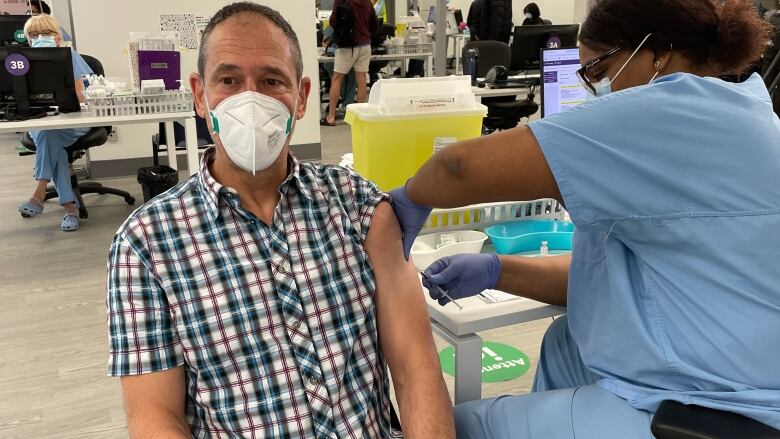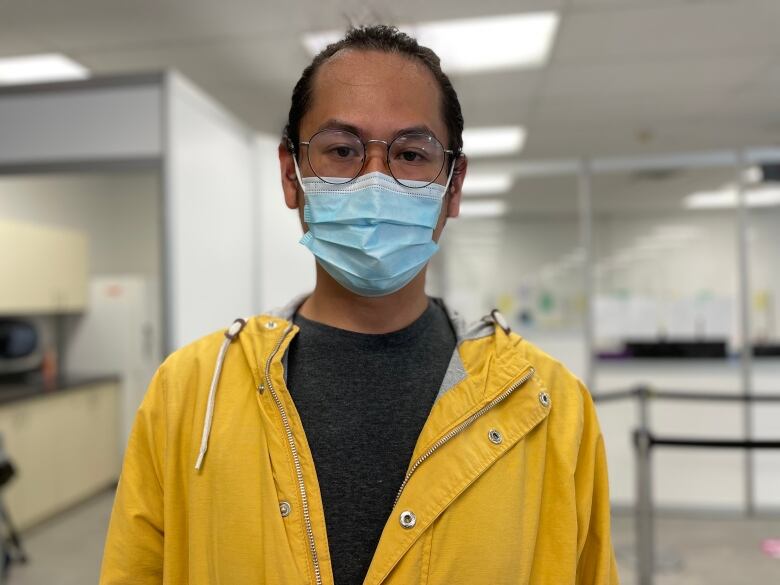Hundreds of Montrealers seek vaccine protecting against monkeypox
More than 800 have received a dose since 1st case of virus was detected mid-May

Emil Briones is breathing a sigh of relief after receiving their first dose of the smallpox vaccine, now being offered to help protect Montrealers against the monkeypox virus.
They are one of more than 800 Montrealers so far who have lined up at the clinic in the heart of the Gay Village that's been offering the vaccine since May 27.
"I'm really happy to have access to this today," they said Wednesday, standing in line at the clinic just around the corner from milie-Gamelin Square.
"I saw [the post about the clinic] on Facebook and you know, just reading up on articles about the outbreaks that are happening, and it is pretty scary."
A total of 90 cases of the virus have been reported in Quebec to date since the first case was reported in Montreal on May 12. Most of them, 86, have been reported in the Montreal area.
The vast majority of the cases in the province areamong adult men who have had sexual relations with men, according to provincial and municipal officials.
Likened to a milder form of smallpox, monkeypox is a rare viral illness that typically begins with symptoms such as fever, headache, backache and fatigue similar to symptoms of COVID-19 or the flu. The most noticeable symptom is a rash or lesions on the skin.
The virus doesn't spread easily between people and is generally transmitted through prolonged close contact via respiratory droplets, direct contact with skin lesions or bodily fluids, or through contaminated clothes or bedding
Lawrence Clifford-Reddy was also getting his first dose of the vaccine on Wednesday, and said he's worried about the stigma it couldgenerate against Montreal's gay community.
He came down to get the vaccine after hearing about the clinic the day prior. Though the spread of the virus is still limited, there's always thechancehe could be unknowingly transmitting the virus.

"I'm a massage therapist that works for the gay community," he said. "I'm hands on throughout the whole body, which is higher risk than just sexual contact is."
"The clinic is right here centredin a hotspot, which is excellent," he added. "It's easy to get it, you can stop by during opening hours and it was available so quickly."
The vaccine against the virus is currently available to those over 18 who have had skin-to-skin contact with someone who has tested positive for the virus, as well as men who have been in sexual contact with two or more men within the last two weeks. No appointments are needed.
Those who believe they may have had close contact with an object contaminated with the virus, such as bedding, can also receive the vaccine. Those with potential symptoms can also test for the virus.
"If you have any worries just come by and we'll help you out. We'll let you know if you can receive one or not," said Danny Raymond, a spokesperson for the health authority representing downtown Montreal, the CIUSSS du Centre-Sud-de-l'le-de-Montral.
Public health officials believe it's still possible the virus can be contained to the gay community, Raymond said.
A total of 5,000 doses of the vaccine, which also protects against smallpox, have been secured in the province.
Monkeypox comes from the same family of viruses that cause smallpox, which the World Health Organization declared eradicated around the globe in 1980.
The health authority has partnered up with RZO, a community organization that provides services for gay and bisexual men, including testing for sexually transmitted diseases and HIV, to help get the word out about the clinic.
Carole Richer, one of the nurses at the clinic, said she's been impressed by the turnout so far.
"They come in because they're well-informed and they're here for prevention. They want to take care of themselves and their health," she said.
The clinic is located at 965 Maisonneuve Boulevard East. Those looking for more information about their eligibility can visit Montreal's public health webpage.
Based on a report by Jennifer Yoon












_(720p).jpg)


 OFFICIAL HD MUSIC VIDEO.jpg)
.jpg)



























































































